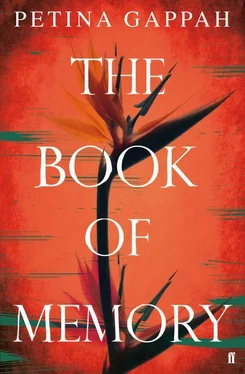It was an easy fraud for Monalisa to pull. All that the embassy required of grant recipients was that they produce quarterly reports of how the money was spent, and these she provided, complete with glowing pictures of Girl Children smiling for the cameras.
When she told me how simple the whole thing had been to set up and pull off, I was surprised that Chikurubi is not bursting with more such fraudsters. Scams go on in almost every embassy, Monalisa said, but most embassies simply fire the persons involved without prosecuting them. They do not want to report to the police for fear of drawing attention to the kinds of activities they fund. In her case, the embassy brought its case against her on the basis of the Girl Child fraud; they said nothing about the OVCs as they did not want too much attention to be given to the political side of their funding.
It seems strange that anyone would voluntarily choose to come to D with the more dangerous criminals, but I understand why Verity and Monalisa bribed their way in from C. There are more than a hundred women in C, baby dumpers sleeping next to drug smugglers and fraudsters and thieves. And there are sometimes babies sleeping with their mothers. There are frequent fights — one woman can look at another in a ‘funny way’, or someone will get worked up because one of the babies is crying too long and too loud and waking up the others.
And there is only one toilet bucket in the cell for all the women to share. If anyone breaks the code that says that only urination is allowed in the bucket after lock-up, the acrimony can turn ugly. This is why there is a scurry of activity outside the ablution block every day just before lockdown. Two C-category prisoners, Truthness and Locadia, went for each other in the garden last week. Truthness had accidentally tipped a bucket over Locadia’s baby, and Locadia had her revenge with blows the next day.
As I am on death row, I should, in theory, live and work separately from the other Ds. I should be in my own section, with my own guards. But the prison is too small and too poor for them to make any real distinction between the others and me. So during the day, I work in the laundry, clear out the Condemn or go out into the garden or further afield, to the prison farm.
I am even allowed to play the occasional game of netball with them, and have learned, like all prisoners soon learn here, that when there is a game of netball against the guards, we should always, but always, lose the game. Jimmy told me that the first time she played, she led the prisoners to an 11–7 rout, and so angered Synodia that she brought forward lock-up by two hours.
If I can ignore the inevitability of the sentence that awaits me, there are a number of advantages to being the only one in D on death row. After lock-up is when I most feel the benefits of being on death row. I am locked up in my own cell. And, luxury of luxuries, I have my very own completely unshared toilet bucket. I have my own Catcher of Wonders.
*
When I first arrived, I found the usual fear-laced fascination and superstition around my condition. I am the first woman in more than twenty years to be sentenced to death. And it is not every day that one comes across a murdering albino outside a novel by Dan Brown. But it was my skin and my crime that caused the other prisoners to shrink into themselves as they walked past me.
In those days, a woman called Marvellous gave me the hardest time. She has now been paroled after serving six years for culpable homicide. She told me that all new prisoners had to give their food to her at meal times. In the first weeks, I gave half my food to her without protest, but I soon came to see that I would starve if I did not find some way to defeat her. So I took to giving her long unbroken stares as she ate my food. ‘Don’t look at me with those eyes,’ she snapped.
I was reminded of my mother. ‘Don’t look at me with those eyes of yours,’ she often said, which never made sense to me, for I could only look at her with my eyes, and nobody else’s, but I know now that she meant those eyes with no colour or pigment to them.
Three days after I began this, Marvellous received news that her son had died. When she asked if she could go to the funeral and Synodia laughed in her face, Marvellous wailed at the top of her voice for more than an hour and only stopped when Synodia threatened to have them add another two months to her sentence. ‘No need to go to court, either,’ Synodia said. ‘We will just mislay your release papers.’
At the next meal, I stared again at Marvellous, and again at every meal for four continuous days. After a week, she asked to be moved away from me. Jimmy told me that she had told the guards that the looks I gave her are what killed her son, ‘just like she killed that white man’. Marvellous became afraid of me, and would not look at me when she passed me. After that, I did not hesitate to use my condition to my advantage.
The chameleon that I picked up in my third month here also added to my mystique. We were out on the prison farm, weeding the maize patch, when I saw a movement among the small green shoots of the new maize. When I saw that it was a chameleon, it immediately reminded me of our old neighbour Liz Warrender, the first person I had ever seen touch a chameleon. I thought of her colourful expressions and her love for gossip. ‘You should see her go after him; I promise you, she is busier than a blue-arsed fly.’
A wave of homesickness washed over me. Without thinking, I reached out to take it into my hands. The creature changed colour from green to grey to brown as it struggled with the sudden change in its environment. Then it took on the colour of my skin and the greenish colour of my uniform as it made its hesitant and slow movement up to my shoulder. In the fugue of my concentration, I did not realise immediately that the cry that rang out had anything to do with me, or the creature on my arm.
I looked up to see Benhilda staring at me with a look of revulsion on her face, the same look of shock that I must have had on my face as a child at Summer Madness the first time I saw Liz pick up a chameleon. The others turned, and instantly moved together, as though their solidarity would ward off the miasma of my evil.
‘It is only a chameleon,’ I said.
‘Only a chameleon?’ The whisper went up and down the line of women.
‘How can you say it is only a chameleon?’ This was Beulah. ‘Are you some kind of a witch that you play with such things?’
The chameleon made a more determined effort to go round to my other arm. I picked it up in both hands, and made my way to a cluster of baby dumpers who gave little shrieks of shock as they scattered. I set the creature down and watched it as it changed colour again before disappearing into the maize.
I had forgotten that, like those creatures of the darkness, like owls and hyenas, chameleons are portents of evil, associated with witchcraft and black magic. The news spread throughout the prison and made me safe from all bullying, at least from other prisoners.
The fear did not extend to the guards. Synodia and Loveness, assisted by Mathilda and Patience, are responsible for guarding D and C sections. To them, we have no names. We are cattle rustlers and murderers, arsonists and prostitutes. They look different from each other. Loveness, the principal prison officer — she is short and round and light-skinned, with several missing teeth. Synodia, recently promoted to assistant superintendent, and thus Loveness’s superior, is a little darker, a little taller, and a lot more sour-looking. Patience is simperingly pretty, all eye- and lip-liner, and Mathilda is well padded with a slow and heavy gait.
But they also look the same, as though they are interchangeable one with the other, as though the specifics of their individualities are subsumed into the uniforms that they wear.
Читать дальше












